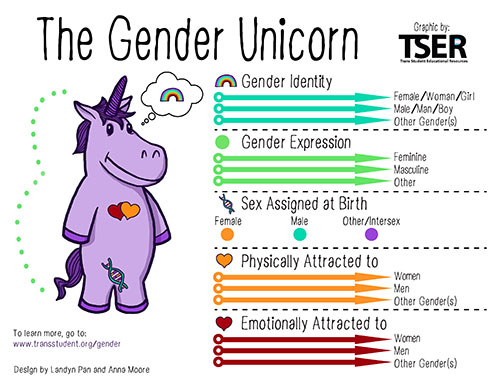An ally can be described as a straight or cisgender person who provides support and advocates for the LGBTQIA+ community.
Being a good ally to the community requires education, advocacy, action and a desire to learn from your mistakes. We all express our gender identity and sexual orientation different ways. These components are separate but interconnected and make us the people we are.
Throughout the world, understandings and concepts of this vary and manifest in different ways. In most countries, when children are born they’re assigned their gender status as male or female based on their genitals.
Surgery on intersex children
Children who are born with ambiguous genitalia, or genitalia that doesn't fit into the categories of male or female are given surgeries to make them aesthetically conform to one sex or another, which can be detrimental to their understanding of their own gender later in their life. This is sometimes done without their consent.
Visit the Intersex Justice Project to find out more about the work being done to prevent unnecessary surgery on children born with ambiguous genitalia, and see how different organisations and charities are working to support intersex people.
Some countries also recognise another category, for example ‘diverse’ for those that don’t fit into these categories. However, someone’s gender identity (a person’s sense of their own gender), and their gender expression (how they express their gender to the world), may be different from the sex they were assigned at birth. Someone’s gender identity and gender expression may also be different from each other.

Here is some useful definitions taken from Stonewall.
| Gender | Often expressed in terms of masculinity and femininity, gender is largely culturally determined and is assumed from the sex assigned at birth. |
| Gender identity | A person’s innate sense of their own gender, whether male, female or something else, which may or may not correspond to the sex assigned at birth. |
| Trans | An umbrella term for people whose gender identity differs from the gender they were assigned at birth. This can include people who identify as non-binary, but not all non-binary people identify as trans. You can find more information about what it means to be trans and how to access support within our Student Trans Policy |
| Cisgender | A term for people whose gender identity is consistent with the gender they were assigned at birth. |
| Gender affirming medical treatment | Treatment that a trans person may undergo to affirm their gender identity. For example, hormone therapy or surgery. It is important to note that this is a very personal choice and not all trans people choose to undergo gender affirming medical treatment. This is also referred to as gender reassignment in equality legislation. |
| Non-binary | An umbrella term for people whose gender identity doesn’t sit comfortably with ‘man’ or ‘woman’. Non-binary identities are varied and can include people who identify with some aspects of binary identities, while others reject them entirely |
We’ve pulled together some tips on how to be a good LGBTQIA+ ally

As well as the guidance above, the following are informal guidelines on how to support people who are trans or non-binary:
Although progress has been made in the last few years and there has been a growing acceptance of diversity in sexual orientation and gender, LGBTQIA+ people still face harmful comments and questions in their daily lives – often known as microaggressions.
These are the everyday reminder that many people, including people we interact with regularly, still don’t fully respect LGBTQIA+ identities.
Here are a series of questions/comments that you shouldn’t say to LGBTQIA+ people: